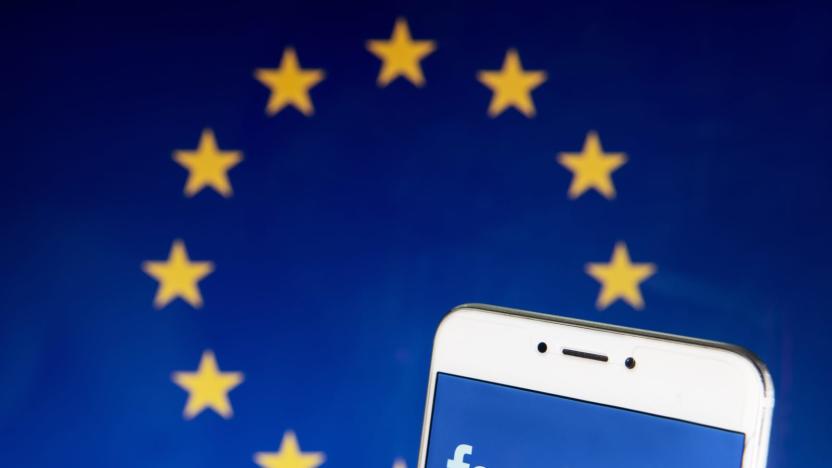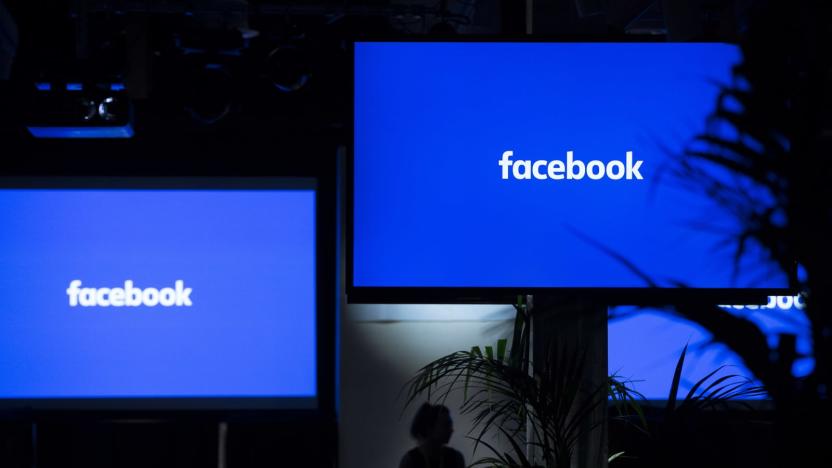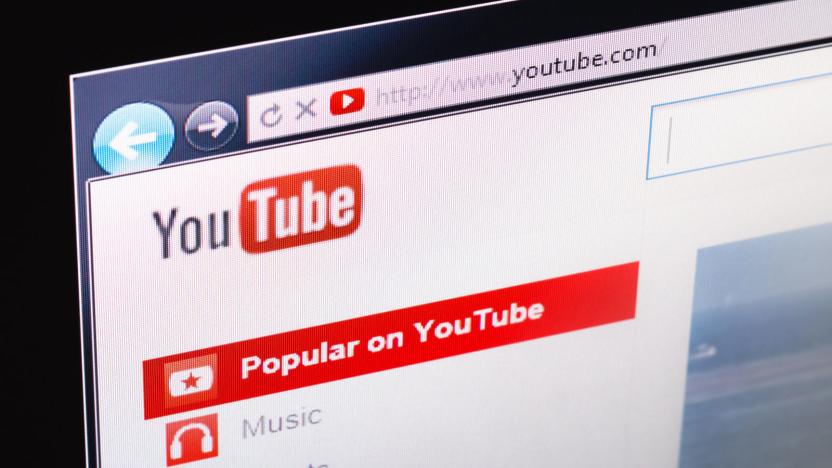datacollection
Latest

Facebook is facing an EU investigation over data collection
Google isn't the only tech giant facing an investigation from European Union antitrust regulators over data collection and monetization. The European Commission has Facebook in its sights too.

New York AG is investigating Facebook over email contact scraping
The New York attorney general's office will investigate Facebook's "unauthorized collection of 1.5M of their users' email contact databases." Earlier this month, it emerged the company had been scraping the contact lists of some users who joined the service after 2016.

Google also has a data-vacuuming iOS app that bypasses the App Store (Update)
Facebook isn't the only tech giant to offer a data-vacuuming app that sidesteps Apple's App Store. Since 2012, Google has allowed people to earn gift cards by offering up their data through its Screenwise project. On iOS and Android, the company gains access to participants' data through a VPN app called Screenwise Meter. But if Facebook's latest turmoils are anything to go by, Google could suffer Apple's ire over it.

CCleaner promises to give users more control over data after backlash
CCleaner, the popular Mac and Windows system cleaning tool, has responded to user outrage over its new user data collection policies, which collected anonymized data to "gain greater insight into how our users interact with the software," according to the CCleaner staff. The data collection methods, called Active Monitoring and heartbeat, were incredibly difficult to opt out of. The team at CCleaner has promised to give users more control over whether or not their data is collected and submitted, as well as implement these changes in a timely fashion.

Data-broker leak exposes 340 million personal records
Exactis might be fueled by data, but its recent blunder is a warning that any database without firewall protection is susceptible to leaks. The data aggregation company recently exposed over 300 million personal records -- statistically speaking, that's enough to cover the entire US population.

Parent groups say YouTube defies underage data-collection laws
The Federal Trade Commission has been asked to, once again, investigate Google's practices around its YouTube Kids platform. A group of child-safety organizations accuse the search giant of violating child protection laws by collecting data, and using that data to advertise, to kids under 13.

Strava simplified how to opt out of its heat map data collection
In January, Strava came under fire for its activity heat map, which showed the locations of military bases in places like Afghanistan, Syria and Somalia. You could even see details like user routes named "Base Perimeter" and "Sniper Alley" near US bases in Iraq and Afghanistan. While Strava did offer the option for its users to opt out of its heat map data collection, many pointed out that doing so required some navigation through the app and was a process that wasn't very straightforward. But Strava recently updated its app and has quietly changed the opt-out process.

Windows 10's data collection allegedly violates Dutch privacy law
Microsoft has already caught flak over claims that Windows 10's data collection is still overly aggressive, but it's now facing a direct legal challenge over how it handles your info. The Netherlands' Data Protection Authority has determined that Windows 10 violates the country's data protection law even after tweaks that came with the Creators Update. Allegedly, Microsoft doesn't "clearly inform" you of the type of data it's using and the reasons why that data is needed. Moreover, officials believe that Windows' default settings prevent you from offering true consent to data gathering.

Google will no longer scan your Gmail for ad targeting
Gmail is the de facto standard for personal email accounts, with more than more than 1.2 billion people using the free service. One criticism, however, is that Google scans your email for keywords so it can better target ads directly to you. Not anymore, though. Just like Google did away with email scanning in the G Suite enterprise version of Gmail, it will do the same for the consumer app. The new rule will go into effect later this year. Google's Diane Greene makes it fairly clear in a blog post: "Consumer Gmail content will not be used or scanned for any ads personalization after this change."

The Meitu selfie app unlocks your anime beauty and personal data
There's a price for the beauty that comes from the Chinese selfie app that's been flooding Facebook, Twitter and Instagram with glowing (with a twist of anime) renditions of your friends: It's data.

Facebook buys data on users' offline habits for better ads
At this point, it's well-known that Facebook is as much an advertising company as it is a social network. The company is probably second only to Google in the data it collects on users, but the info we all share on the Facebook site just isn't enough. A report from ProPublica published this week digs into the vast network of third-party data that Facebook can purchase to fill out what it knows about its users. The fact that Facebook is buying data on its users isn't new -- the company first signed a deal with data broker Datalogix in 2012 -- but ProPublica's report nonetheless contains a lot of info on the visibility Facebook may have into your life.

UK government should retain mass surveillance powers, says report
An "undemocratic" and "unnecessary" patchwork of laws that facilitate the UK government's use of mass surveillance should be abandoned in favour of new legislation "drafted from scratch." That's the conclusion of a new, independent review commissioned by the government, which broadly supports the current powers available to intelligence services.

New bill would extend Patriot Act surveillance until 2020
In case you haven't heard, the Patriot Act's Section 215 is set to expire June 1st. That's the provision that National Security Agency uses to justify its bulk data collection practices. However, Senate Majority Leader Mitch McConnell is working to make sure the current rules remain in place. McConnell introduced a bill earlier this week that would extend the Patriot Act's justification of post-9/11 surveillance until 2020. What's more, the senator already put the bill on the Senate calendar using a rule that allows him to bypass the usual committee process.

Court clamps down on warrantless surveillance case against NSA
This week, a US District Court judge ruled in favor of the NSA in a case challenging its tactics of intercepting messages on the internet without a warrant. California District Judge Jeffrey White said that the plaintiffs in Jewel vs. NSA didn't establish the legal standing needed to pursue claims that the US government violated their Fourth Amendment rights. White ruled that there wasn't enough evidence presented by the plaintiffs, and that the risk of revealing of state secrets would prevent the case from going forward even if they had. The group, who are all AT&T customers being represented by the Electronic Frontier Foundation (EFF), still has a case against the wider telephone record collection and other forms of mass surveillance employed by the National Security Agency. Jewel vs. NSA was filed in 2008 and is one of the earliest lawsuits brought against the federal government over its monitoring practices, preceding the whistleblowing work of Edward Snowden. [Photo credit: AP Photo/Rick Bowmer]

Obama places modest limits on NSA data collection for non-citizens
A bill that would've effectively ended the US government's current mass phone surveillance program was killed by the Senate back in November. But today, President Obama announced his own limits on the NSA's monitoring of foreigners. The agency will only be able to keep info it collects through electronic surveillance of non-citizens that doesn't pertain to national security for five years. Of course, the director of national security can grant an extension if circumstances warrant one. What's more, gag orders on the FBI's national security letters seeking information from companies will now expire after three years, but again, extensions are an option should the need arise.

New bill aims to curb US government backdoor spying
While the FBI thinks that all communication tools in the US should have backdoors for law enforcement, a new Senate bill has proposed the exact opposite. The Secure Data Act, introduced by Senator Ron Wyden, would prohibit the government from forcing companies like Google and Apple to grant access to encrypted data. A different bill to curb the NSA and other agencies (the USA Freedom Act) was denuded by the House of Representatives, while a recent vote allowed the Feds to carry on with massive surveillance. However, the Secure Data Act would specifically bar US agencies from forcing private companies to "design or alter their commercial information technology products for the purpose of facilitating government surveillance."

California limits schools' social media monitoring
In California, school officials are now required to be more transparent when tracking a student's online activity. Governor Jerry Brown signed a bill earlier this week requiring parents to be notified when a school is peering at their kids' online activity. What's more, schools have to delete collected social media posts within a year of the student leaving or their 18th birthday. The law comes in response to the Glendale Unified school district hiring an outside firm to monitor Twitter, Facebook and Instagram feeds in 2013 -- without informing students or their parents that they were being watched. "I believe that as the world changes and this type of monitoring becomes more commonplace, legislation like this is critical to protecting the privacy of our children," said California State Assemblyman Mike Gatto. Glendale Unified says it doesn't keep posts that it's alerted to via the monitoring service. [Photo credit: Photo by David Livingston/Getty Images]

NSA says it's not collecting images of US citizens for facial recognition
Over the weekend, reports surfaced on the NSA using facial recognition to scan the web and match faces with intelligence data -- thanks to another Edward Snowden leak. Today, Admiral Mike Rodgers, the head of the organization, denied collecting images of folks in the US on the regular. While Rogers did admit that efforts used the tech to obtain more info on intelligence and counterterrorism targets abroad, he explained "We do not do this on some unilateral basis against US citizens." Unless a said citizens are part of an on-going investigation, online snapshots are said to remain out of the NSA's crosshairs. Not surprisingly, Rogers didn't go into much detail, but he did say that reports of the security agency searching through driver's license photo libraries were inaccurate.

Companies would be in charge of phone records under Obama's new data collection proposal
The extent to which the NSA collects bulk phone call metadata has been one of the most prominent topics within the ongoing government-surveillance scandal. President Barack Obama promised reform, and not long after, a court approved measures that meant the NSA had to begin formally requesting access to records, and could only stray two degrees of separation from the original target. Today, news from the White House explains how the program could change further (much of which was revealed unofficially a couple of days ago). The proposal, which was drafted following a full review of the program, puts telecom companies in charge of the data, not the government. They'd keep it for no longer than they currently do (around 18 months), but would be "compelled" under court orders to provide records in a "timely manner" and a "usable format."Once a data request has been court-approved, the powers that be have a window of time in which to solicit records without needing repeated approvals. The hope is that, if approved "with the passage of appropriate legislation," this tweaked program will alleviate some privacy concerns by taking the data out of the government's hands, while still keeping the intel available for when it's needed. As the proposal is only under consideration, the Obama administration will ask the Foreign Intelligence Surveillance Court (FISC) for a 90-day renewal of the current phone metadata collection program, February amendments included.

WSJ: Four ways to distance the NSA from phone records that'll be considered by government
President Obama has his work cut out for him as he tries to restore faith in the US government following the whole NSA spying scandal. He first talked of surveillance reform last year, then in a January 2014 speech promised to revamp the NSA's program for collecting phone records. While the agency must now seek court approval to access phone data, The Wall Street Journal is reporting that "administration lawyers" have finished drafting several proposals that would bring about more radical changes to the program by taking the database out of the NSA's hands. These are said to be part of a wider report due in March, in which other scenarios that strip some power from the government spy agency will be explored. One of the proposals would see phone companies responsible for managing the records, which the NSA would then request on a case-by-case basis. Apparently the idea hasn't gone down too well, with companies wary of being inundated with data requests from elsewhere; not to mention they haven't been involved in crafting the proposals. (Besides, do you trust AT&T and Verizon anymore than the government?) Another idea would see a different government entity such as the FBI (which is allegedly a contender, despite its own indiscretions) or Foreign Intelligence Surveillance Court be put in charge. It's also been suggested a new independent organization be created that would technically be neither a part of the government nor a phone company. Though, the concern there is any newly created body would ultimately end up serving as an extension of the NSA. Of course, there's always the last option of doing away with the phone surveillance altogether, which we're sure many would celebrate, but seems highly unlikely. There's always the possibility that another solution is agreed upon, but for now these seem to be the primary options available to the Commander in Chief.












